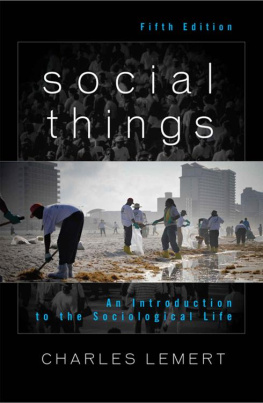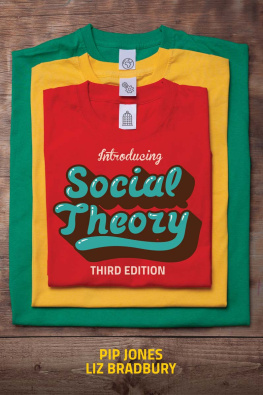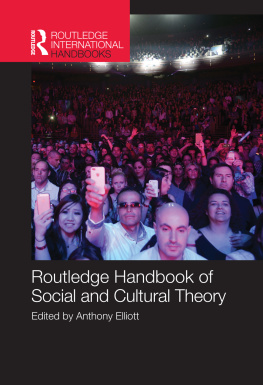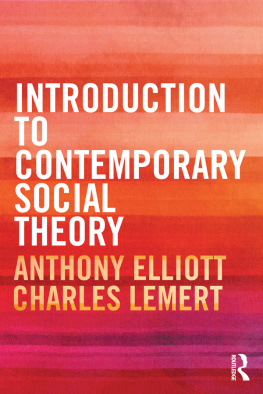First published 2007 by Paradigm Publishers
Published 2016 by Routledge
2 Park Square, Milton Park, Abingdon, Oxon OX14 4RN
711 Third Avenue, New York, NY 10017, USA
Routledge is an imprint of the Taylor & Francis Group, an informa business
Copyright 2007 by Charles Lemert.
All rights reserved. No part of this book may be reprinted or reproduced or utilised in any form or by any electronic, mechanical, or other means, now known or hereafter invented, including photocopying and recording, or in any information storage or retrieval system, without permission in writing from the publishers.
Notice:
Product or corporate names may be trademarks or registered trademarks, and are used only for identification and explanation without intent to infringe.
Library of Congress Cataloging-in-Publication Data
Lemert, Charles C., 1937
Thinking the unthinkable : the riddles of classical social theories / by Charles Lemert.
p. cm (Great Barrington books)
Includes bibliographical references and index.
ISBN-13 978-1-59451-185-1 (cloth: alk. paper)
ISBN-13 978-1-59451-186-8 (pbk.: alk. paper)
1. Sociology. 2. SociologyHistory. I. Title.
HM585.L394 2007
301dc22
2007002098
Designed and Typeset by Mulberry Tree Enterprises.
ISBN 13: 978-1-59451-185-1 (hbk)
ISBN 13: 978-1-59451-186-8 (pbk)
I began college in 1955, if you can imagine such a time. I barely can. Now, so many years later, the world of my youth is gone beyond the fringe of memory. It was a time when white boys, like me, of doctor fathers and stay-at-home mothers from nondescript suburbs, had a free ride. We had to do very little to be assured that the dull but well-padded lives of reckless childhood would be ours forever. The odds were in our favor. We had to do so little to gain so much because we had the playing field to ourselves.
America was riding high, or so we were told and so it seemed. Everyone we knew had some money, and some had a lot. Few girls wanted to compete for the jobs we would get. Those who did rarely succeeded. We thought, if we thought at all, that this was the nature of things. We seldom saw Black people but for ones like Florence, whom I loved, who brought us up and taught us some things about real life. They were our lifelines to what consciousness might have dawned on our dim wits. In fact, we had no reason even to notice anyone different from us; and so we did not. In high school we played like hell, drank cheap beer in back seats, dreamed of getting laid (seldom did), swam in dark, bottomless quarries, and all the rest that went for happy days in white America. Of course, we did little schoolwork. We were the first of a kindneither rich nor pedigreed, we wore our privilege casually.
Our consummate shallowness was not ours alone. We inherited it. Our parents had suffered through the Depression and the First World War. Suffered was their word and we were expected to honor it. In bad economic times my fathers deprivations were few and far between. He went to medical school. In war, he was gone for three years to India. An officer in the medical corps, he dined with maharajas, whatever they were. The worst I could suppose is that he had been screwing his brains out with lovely locals. But something happened. He was never the same, though what he had been before the war may be little more than what I wished he would have been. This was another element of the greatest generationthose who invented their suffering to justify joining their fates with the others who had suffered. The fifties was pay-back time in America for the sufferings of the thirties and forties. Take what you can get. Enjoy life. Have babies. Live in the suburbs. Learn golf. Buy a boat. Vacation in Michigan. Whatever. This was the life my kind of kid lived. We believed as we were taught, that we had a right to it. And so we took it.
When I started college the fall of 1955 I was happy-go-lucky. The campus was bucolic in a provincial sort of way. The girls were knock-outs. Their freshly swollen breasts pressed out at us through cashmere sweaters. We would join a fraternity, drink more beer, eventually get laid. These were the years before we would have to grow up, not that we had any idea what that might mean or why it had to be done. Thus, when I moved into my dormitory room in Reid Hall, across from the football fields, I was not afraid of anything.
I was assigned to live with two other boys, both from somewhere else in Ohio. I forget the one. The other I remember. His name may have been Kevin. His manner was troubling. He was, at least, different. Kevin was dark and brooding. Not quite shy, but certainly not at all friendly. He spoke with a touch of nervousness, often speeding up his talk perhaps to keep time with a tune only he could hear. Fortunately, he did not talk often. Unfortunately, he was given to strange outbursts of temper, none of which could be traced to any occurrence between us or others in the vicinity. This was not what I had bargained for.
This, I now realize, is life as it actually is behind the intricate stage settings that play up the good life to cover up the dirty backstage. Though I did not think it at the time, being faced with Kevin whom I could not figure out may have been one of the moments when I began to grow up. Only years and therapies later did I understand that I had met Kevin before in the dark depression of my father. Then, as a child, this was too close. I went blind and numb to avoid the idea that craziness and disappointment were part of the deal. Being alien to my tight emotional neighborhood, Kevins disconnected madness made such a difference real, not to be denied.
With Kevin things went from bad to worse. One night he got up to pee while I was still working. On the way back to his bed, he jumped at me out of the dark. He yelled something incoherent in his strangely nervous way. Soon after, Kevin began to leave his dirty underpants in the middle of the room. Once he dropped a notably soiled one on my desk. He began talking to himself, pacing up and down the hallways, or in circles in our small room. It all came to a head one day after lunch. Hoping for a nap, I had gone back to the room, whereupon Kevin leapt from his upper-deck bed, grabbing me about the neck with one arm, beating me alongside the head with the other. The instinct to defend myself went limp. Instead, I bent over and let him bang away until he grew weary and left the room, talking to himself, as if nothing had happened. Nothing so out of nowhere happened after that. We somehow came to unspoken terms with these unfathomable differences, which slowed to an uneven murmur.
By the end of that first semester, both Kevin and the other kid were gone, back to wherever they had come from. They were among those who were more or less intentionally flunked out to make room for Korean War veterans on the wait list. These guys, most of them older by a lot, were another story I could not read. They drank as we did, but their carousing had an edge not yet on ours. In that year I began to change. I studied more than ever before. I played sports as before, but without urgency. I dated pretty girls, hoping to get my hands under those cashmere sweaters. I joined a fraternity, which helped the dating. The fact that I studied made me different from the brothers. This was perhaps the first time that I allowed myself to be the different one. My good grades, it turned out, had excellent exchange value. The brothers lent me the status of being one of them, while I gave them grades high enough to keep the fraternity off probation. They went on to lives of unmerited successes. They walked from campus to corporation. They married pretty girls and sired children, who oddly enough did not all grow up to follow the callow parental lead.







